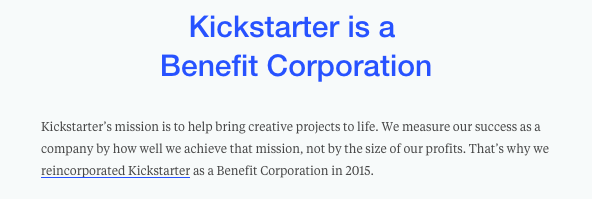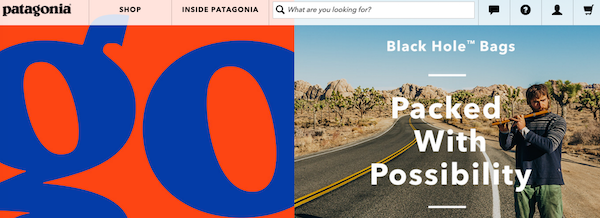Kickstarter is a big name in the rewards crowdfunding industry. As of 2015, Kickstarter has enabled over 92,000 projects to raise more than $1.9 billion on their platform. On September 21 2015, Kickstarter announced that they will no longer be known as Kickstarter Inc – from now on they are Kickstarter PBC (which stands for Public Benefit Corporation).
You might be asking yourself, “What is a Public Benefit Corporation?” or “Why is that such a great thing?” In this post I explain what a Benefit Corporation is and what this means in the context of Kickstarter’s overall mission.
What is a Public Benefit Corporation?
A Public Benefit Corporation is a for-profit company that is legally bound to not only consider the effects of its decisions on shareholders, but also the impact of their choices on workers, the community and the environment. Once a year they are required to release a public a benefit report that measures their social and environmental performance.
The common belief is that for-profit companies should put profits above social good, but that trend is slowly beginning to shift. Rather than choosing to be completely non-profit or for-profit, organizations are choosing to reincorporate themselves as Benefit Corporations. This allows them to keep social good at the forefront of their operations and still bring value to shareholders. B-Lab considers this to be a new class of corporation, where:
“Benefit corporations are required to make a material positive impact on society and the environment and to meet higher standards of accountability and transparency.”
One other corporation who has done this is Patagonia, an apparel company that works hard to promote social good by donating time, services and at least 1% of sales to grassroots environmental groups.
To learn more about how to become a Benefit Corporation, check out this website.
What does this mean for Kickstarter?
Kickstarter is famous for its mission to help bring creative projects to life, and becoming a Public Benefit Corporation is intended to help them incorporate that goal into their legal framework. Now the Kickstarter team has the power to make decisions based on their overall societal impact and stick to their values over making decisions based on profitability alone.
Now that Kickstarter has reincorporated as a Benefit Corporation, they have released a new Charter to let the public know about the commitments they have made, their values and their mission. Once a year they will release a statement that shows the results of their efforts to promote the public benefits outlined in the Charter (you can expect the first one in February 2017).
One big change Kickstarter has made it their commitment to donate 5% of their annual post-tax profits to arts education and organizations fighting inequality.
The new Charter is divided into five broad categories, each one including several specific ways that they will ensure that these standards are being maintained:
- Kickstarter’s mission is to help bring creative projects to life.
- Kickstarter’s operations will reflect its values.
- Kickstarter supports a more creative and equitable world.
- Kickstarter is committed to the arts.
- Kickstarter is committed to fighting inequality.
A couple examples of where Kickstarter goes into more detail are:
“Kickstarter will never sell user data to third parties. It will zealously defend the privacy rights and personal data of the people who use its service, including in its dealings with government entities.”
And:
“Kickstarter will engage beyond its walls with the greater issues and conversations affecting artists and creators.”
In their announcement, Kickstarter notes that none of their shareholders voted against this decision. This goes to show that the platform’s supporters all feel that Kickstarter should stay true to its mission and not change the way they do things just because they might earn more money.
Conclusion
While other platforms are quick to embrace changes that can lead to more growth and profits (like Indiegogo, who reportedly plans to enter the equity crowdfunding market in the future), Kickstarter is headstrong about maintaining the values that they put forward when they first launched in 2009 – something that I think creators and backers on the platform appreciate.
Kickstarter has done a great job of cultivating a special sense of community around their platform, which is one of the reasons why backers and creators often return for more. It will be interesting to see how this change affects Kickstarter overall, and I’m sure many of us will be looking forward to reading their first annual benefit report (I know I am!).






